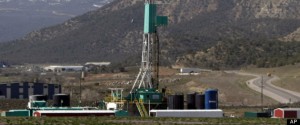 WASHINGTON — Natural gas drillers would be required to disclose the chemicals they use in hydraulic fracturing or “fracking” on public lands, according to draft rules created by the Department of Interior. The proposed regulations would also force companies to report the amount of any given chemical injected during the fracking process.
WASHINGTON — Natural gas drillers would be required to disclose the chemicals they use in hydraulic fracturing or “fracking” on public lands, according to draft rules created by the Department of Interior. The proposed regulations would also force companies to report the amount of any given chemical injected during the fracking process.
The move for increased regulation comes after President Barack Obama touted his commitment to expanding natural gas production while ensuring the drilling is done responsibly. “My administration will take every possible action to safely develop this energy,” he said during his State of the Union address last month. Fracking, which involves the high-pressure injection of undisclosed chemicals into rocks containing oil or natural gas, has drawn increasing scrutiny from environmentalists who suggest the process contaminates groundwater and destroys ecosystems.
Under the proposed regulations, companies would be required to reveal the “complete chemical makeup of all materials used,” according to a copy of the rules obtained by The Huffington Post. But environmentalists have noted that, while the regulations offer some “good elements,” the rules still offer companies considerable protections for “trade secrets,” an exemption some worry could negate the rule.
Interior Secretary Ken Salazar has said regulations will also cover well-bore integrity and regulation of flowback waters (the fluids that rise to the surface after hydraulic fracturing operations are complete). Further, reports detailing the ingredients used in the fracking fluids and a fluid treatment plan must be submitted 30 days before operations begin at any proposed well.
Interior spokesman Adam Fetcher elaborated in a statement.
“Those measures are straightforward: 1) requiring public disclosure of chemicals used in fracking, with appropriate protections for trade secrets; 2) improving assurances on well-bore integrity, so we know fluids going into the well aren’t escaping; and 3) making sure companies have a water management plan in place for fluids that flow back to the surface,” Fetcher said.
“We will continue to gather public input throughout this process,” he added, “to ensure that the disclosure rule enhances public confidence in hydraulic fracturing on public lands, while also encouraging continued safe and responsible exploration and production for many decades to come.”
The federal guidelines come after the Environmental Protection Agency conducted a study that showed that fracking was responsible for contaminated groundwater at an aquifer that supplied public drinking water to people in Pavillion, Wyoming.
The EPA has since been tasked with formulating rules on emissions from natural gas operations around the country. “EPA is also working on guidance for when diesel is used as a fracking fluid,” an administration official said.
But the agency’s report on water contamination is already under attack on Capitol Hill.
U.S. Senators Rob Portman (R-Ohio) and Mary Landrieu (D-La.) have voiced their skepticism of the report, arguing in a letter to the Office of Management and Budget’s Cass Sunstein that the EPA must be forced to comply with legal standards of scientific integrity as it finalizes its report on Pavillion ground water contamination.
OMB’s Information and Regulatory Affairs is responsible for policing the quality of agency science.
“A false-positive link between fracturing and groundwater contamination could form the basis for costly new regulation that will do little to protect human health,” said the senators in their letter on Monday. “Natural gas development is estimated to contribute hundreds of billions of dollars to the United States economy … There is little doubt that the regulatory response this report could generate may exceed the $500 million threshold.”
Federal fracking regulations would apply only to the process when it is carried out on federal lands, not to the fracking industry as a whole, which is largely exempt from federal oversight. But if the proposed regulations are successfully implemented, they could help bring parity to fracking regulations, which vary widely by state.
“The president specifically focused on the disclosure issues because that’s an area where the federal government can show leadership,” an administration official acknowledged. “This is an area where often states are in the lead, but we do do fracking on public lands so the president is looking to Department of the Interior and the Bureau of Land Management.”
In December Texas became the first state to require the disclosure of fracking chemicals. Rules enacted shortly thereafter in Colorado went further, requiring that the concentrations of chemicals also be disclosed, according to the Associated Press.
Chesapeake Energy Corp, the second-largest U.S. producer of natural gas, says it voluntarily discloses data about its fracking practices on a website run by state water regulators. Participation in the well-by-well database is voluntary, but that hasn’t stopped the Independent Petroleum Association from arguing the new federal regulations are superfluous.
Following the internal review and and consultation of tribal governments, a formal draft report will be released for a public comment period, during which feedback from industry, state, local and all other interested parties will be solicited.
By Lucia Graves, reporter at Huffington Post. Anna Staver contributed to this report.
From Huffington Post via Women Of Green